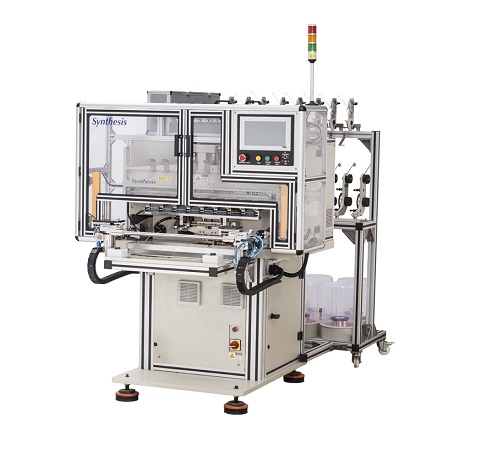CNC Winding Machine
A CNC Winding Machine, powered by Computer Numerical Control (CNC) technology, is a cutting-edge device designed to automate and streamline the process of winding various materials, such as wires, coils, yarns, and fibers. This advanced machine is equipped with precise control mechanisms, allowing for accurate and repeatable winding for a multitude of applications. CNC winding machines combine the benefits of automation and customization, catering to industries that require efficient, precise, and versatile winding processes.
Features of CNC Winding Machines:
CNC Precision : Utilizing CNC technology, these machines offer unparalleled control over winding parameters, ensuring accurate and consistent winding.
Automated Winding : CNC winding machines automate the entire winding process, minimizing human intervention and maximizing efficiency.
Variable Speed and Tension Control : Adjustable speed and tension controls accommodate different materials, gauges, and winding requirements.
Wire Guide Systems : Advanced wire guide systems ensure precise placement of the material, minimizing errors and overlaps.
Programmable Parameters : Users can program intricate winding patterns, material specifications, layering, and other parameters.
Customization : CNC capabilities allow for the production of customized designs, shapes, and winding configurations.
Real-time Monitoring : These machines provide real-time monitoring and feedback, enabling quality control and optimization.
Benefits of CNC Winding Machines :
Unmatched Precision : CNC technology guarantees precise winding, resulting in consistent and high-quality end products.
Time Efficiency : Automation accelerates the winding process, reducing production time and increasing output.
Complex Winding Patterns : CNC winding machines accommodate complex winding patterns and designs for specialized applications.
Material Optimization : Accurate winding minimizes material wastage, contributing to cost savings and resource efficiency.
Applications of CNC Winding Machines:
Electromechanical Components : CNC winding machines are essential for manufacturing coils used in motors, transformers, solenoids, and inductors.
Textile and Apparel Industry : These machines wind threads, yarns, and fibers onto bobbins for textile and apparel production.
Electronics Manufacturing : CNC winding machines produce coils for various electronic devices, including sensors and actuators.
Automotive Sector : Coils used in automotive systems, such as ignition coils and sensors, are manufactured using CNC winding machines.
Magnetic Field Assistance:
Magnetic coilers utilize magnetic fields to guide and facilitate the winding of wire around the core, ensuring uniform and controlled winding.
Variable Speed Control:
These machines offer variable speed controls to adapt to different wire types, gauges, and winding requirements.
Tension Control:
Advanced tension control mechanisms maintain optimal wire tension during the winding process, preventing wire slack or breakage.
Wire Guide Systems:
Magnetic coilers are equipped with precise wire guide systems that help position the wire accurately on the core, minimizing the risk of overlapping or misplacement.
Programmable Parameters:
Many machines allow users to program winding parameters, including wire diameter, turns count, layering, and more.
Customizable Core Compatibility:
These magnetic coilers accommodate various core shapes and sizes, offering versatility in component manufacturing.
Automated Counting and Sensors:
Magnetic coilers feature counters and sensors that track the number of windings, ensuring accuracy in production.
Benefits of Magnetic Coilers:
Precision and Consistency: Magnetic coilers ensure consistent and precise winding, leading to the creation of high-quality electromagnetic components.
Time Efficiency:
Automation speeds up the winding process, enhancing overall production efficiency and reducing manufacturing time.
Optimized Resource Utilization:
Accurate winding reduces material waste, contributing to efficient resource management.
Enhanced Quality Control:
These machines minimize the risk of human errors, resulting in higher product quality and reduced defect rates.
Applications of Magnetic Coilers:
Electromagnetic Components: Magnetic coilers are used in manufacturing coils, inductors, solenoids, and other electromagnetic components for various industries.
Telecommunications:
Coils used in communication devices, antennas, and signal processing equipment benefit from the precision of magnetic coilers.
Power Generation:
Magnetic coilers are utilized in the production of inductors and coils for generators and alternators.
Automotive Industry:
Components such as ignition coils and sensors in automobiles rely on the accurate winding provided by magnetic coilers.
Conclusion:
In conclusion, CNC winding machines represent the epitome of advanced winding technology, offering precision, automation, and versatility. They are crucial for producing high-quality components used across industries. By incorporating CNC technology into winding processes, these machines ensure consistent and efficient production, contributing to the reliability and performance of various applications that rely on precise winding.


